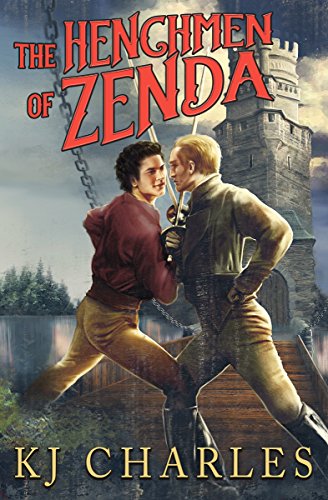"[Rudolph Rassendyll's account] gives us a beautiful, passionate princess, a man who renounces love and crown for the sake of a greater and purer cause, and a villain -- such a villain. Rupert of Hentzau: reckless and wary, graceful and graceless, handsome, debonair, vile, and unconquered. Rupert flees the pages of Rassendyll's story a thwarted monster, never to be seen again; Rassendyll retires from the field with honour unstained; and the true King of Ruritania reigns in Strelsau.KJ Charles' witty, swashbuckling and cynical take on Anthony Hope's A Prisoner of Zenda, as told by professional henchman Jasper Detchard ('I had not lived the life I had to be called proper'), and featuring the dashing young Rupert of Hentzau, who has previously confined his amorous exploits to women but can, it turns out, be persuaded to diversify.
What a pile of shit.
My name is Jasper Detchard, and according to Rassendyll's narrative I am dead. This should give you some idea of his accuracy ..." [p. 1]
Charles' pastiche of Hope's style is commendable, though Jasper's narrative lends itself to more insalubrious language and innuendo than the original ('unless you feel there might be any chance of unlawful entry tonight?' [loc. 870]). More to the point, she turns Hope's story inside out and examines each character's actions, motivations, loyalties and affections -- discovering, or illuminating, quite a different tale that's considerably less high-minded. Charles' women have agency and intelligence: they are, indeed, the drivers of the story, and their roles are correspondingly more complex. Rassendyll is a pompous fraud (so, pretty much exactly like the original) and neither Rudolph nor his black-haired brother Michael are especially fit to be king. Rupert of Hentzau is, as advertised, dashing and melodramatic, and good with a blade. And Jasper ... I like Jasper a great deal. He is cool, detached, often exasperated: he sets more store in good manners than in passionate avowals. I think he could be described as aromantic, though I find the ending (which isn't the traditional monogamous till-death, etc) remarkably happy and wholly in character for Jasper and his lover.
I interviewed Charles last year and she swore that she'd manage to insert a reference to the better-known, more Christmassy Rudolph. I am happy to confirm her success.

No comments:
Post a Comment